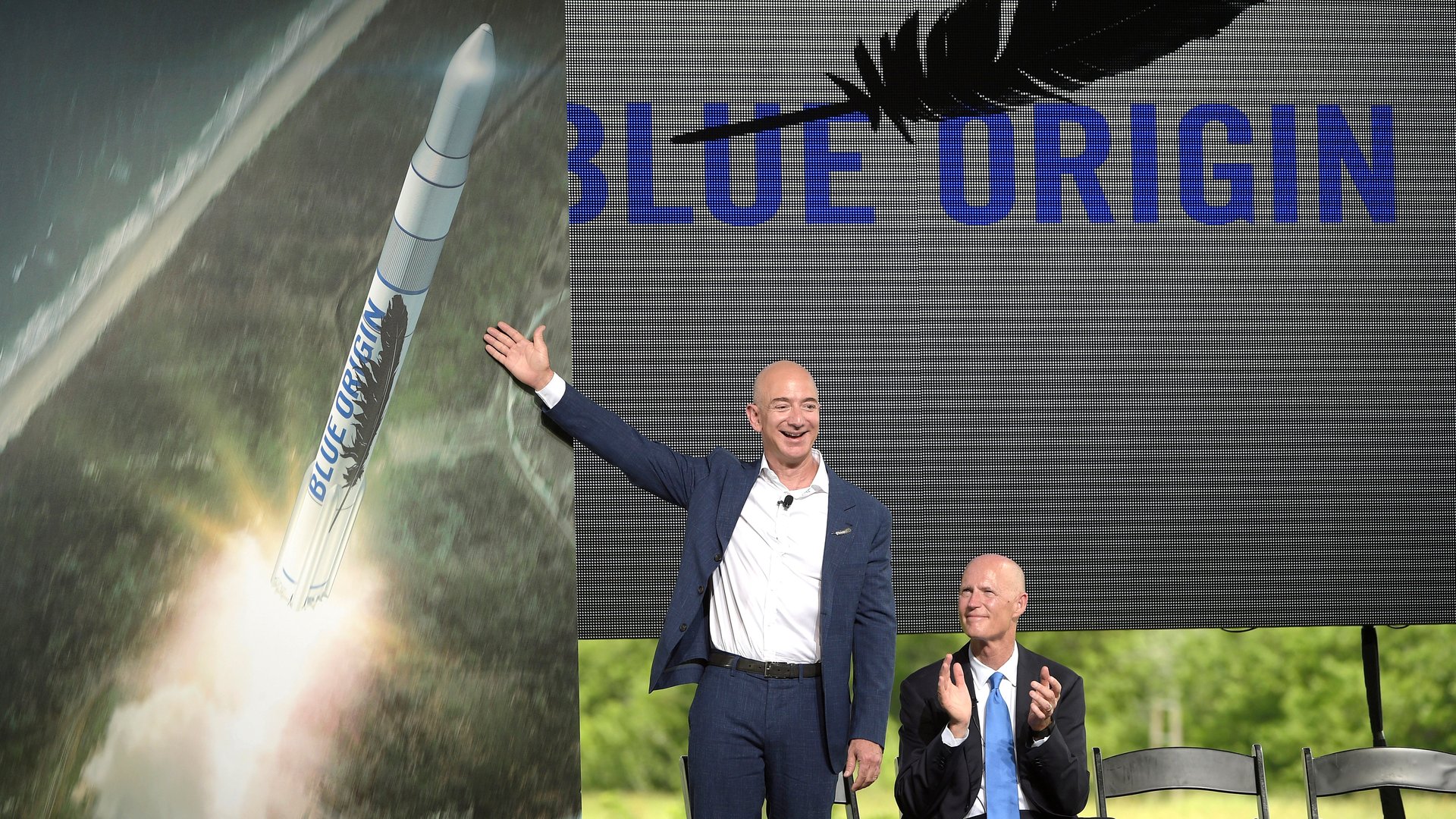What is slowing down Jeff Bezos’ enormous rocket?
The vehicle central to Jeff Bezos’ plans to expand human life into the solar system has been delayed for a second year, and it’s not clear why.


The vehicle central to Jeff Bezos’ plans to expand human life into the solar system has been delayed for a second year, and it’s not clear why.
Blue Origin, the space company Bezos founded in 1999 after Amazon went public, said in a post on its website yesterday that the first flight of the New Glenn rocket would not take place until the last quarter of 2022.
The enormous New Glenn would be the first Blue Origin rocket capable of flying into orbit to launch satellites or transport astronauts, two capabilities the company currently lacks. When the rocket was announced in 2016, its maiden flight was expected in 2020.
The company suggested one reason for the delay is the Pentagon’s decision not to award Blue Origin a contract to launch US military spacecraft, writing that “this updated maiden flight target follows the recent Space Force decision to not select New Glenn for the National Security Space Launch (NSSL) Phase 2 Launch Services Procurement (LSP).” A Blue Origin spokesperson said losing the contract cost the company $250 million in expected engineering funding, and foregone revenues estimated at $3 billion.
There’s no question that missing out on the sought-after contract was a loss for Blue. The chosen companies—Boeing-Lockheed Martin joint venture United Launch Alliance (ULA) and Elon Musk’s SpaceX—promise to shape the future of the US rocket industry. But the Space Force decision was announced six months ago, and suggesting it’s at fault for the New Glenn delay doesn’t gibe with Blue’s previous statements.
How important was national security funding to New Glenn?
Before the final contract was awarded, Blue Origin argued publicly that the US should choose three launch providers instead of two, because there was enough private demand for launches to preclude government subsidies. At the time, Blue and several other companies had been awarded development funding ahead of the selection, while SpaceX had not; a fierce debate emerged among the competitors about whether that funding was unfair.
In a 2019 interview with Blue Origin CEO Bob Smith, Quartz asked whether there was tension between the argument that the commercial market could already support three US launch companies, and the argument that Blue needed funding from the US Air Force to get its rocket off the ground. Smith said the government funding was only needed to meet specific Pentagon requirements, like special infrastructure to mount satellites on rockets that are already standing vertically.
“The issue is if you don’t have the DOD-specific infrastructure and the DOD-specific certification, you can’t compete,” Smith said. “So I can be a very capable commercial launch provider winning up a slew of business and providing great value, but unless you actually have invested in that DOD-specific infrastructure and those DOD-specific certifications, those commercial launch providers literally cannot go compete for that business.”
At the same time, the existence of Blue’s lobbying effort in 2019 shows that it wasn’t confident it would receive the government funding. The company also confirmed today that a critical design review of the New Glenn, a key step in the engineering process to finalize the vehicle before production, took place in 2019. Given the billions of dollars invested in Blue Origin by Bezos, it’s not clear why a $250 million deficit recognized six months ago would lead to an added year of delay now, especially since New Glenn was originally expected to launch Blue Origin customers muSpace and Eutelsat this year. Blue said it could not provide an executive to speak to these questions.
There is one publicly known fact about the New Glenn’s path to orbit: It relies on the same advanced rocket engine that Blue Origin is selling to ULA to power its next-generation rocket, and that engine was delivered late. The first BE-4 was delivered to ULA in July 2020, and ULA CEO Tory Bruno reported that Blue Origin was still resolving engineering issues in October 2020. ULA will need flight-qualified engines before it can debut its own Vulcan vehicle on a Moon mission expected this year, but they have not yet been delivered. A Blue Origin spokesperson denied that the BE-4 played a role in the New Glenn delay.
Though mysterious, New Glenn’s delays are not unusual: The development of space vehicles is notoriously difficult, with one US government study suggesting the average program is delayed 27 months. Problems as tiny as failing to clean hardware or as large as choosing the wrong component can lead to months of redesigns and re-tests before the process can move forward.
Bezos announced his plan this month to step down as CEO of Amazon in order to focus on other priorities, among them Blue Origin. Besides New Glenn, Blue Origin is also running behind on plans to fly passengers on its suborbital rocket, New Shepard, which the company had hoped to do in 2019 and 2020. The company is also vying to build a vehicle that would carry astronauts to the surface of the moon from lunar orbit.